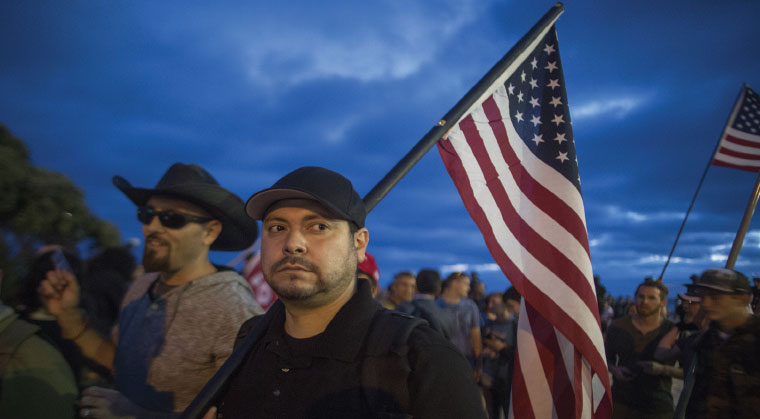The Moment Bibi’s Waited Eight Years For


SAME PAGE Netanyahu and Trump will find themselves on the same page for three major reasons: They both think big share common enemies and view the Middle East through a wide regional perspective (Photos: AFP / Imagebank)
Writing an analysis of Prime Minister Netanyahu’s meeting with President Trump two days before it takes place requires prognostication beyond the abilities of mortal man.
Since shouting “hold the presses” won’t make a difference here goes.
Netanyahu and Trump will find themselves on the same page for three major reasons: They both think big share common enemies and view the Middle East through a wider regional perspective.
For years Netanyahu has warned that Iran poses an existential risk to Israel and a major military threat to the West.
Trump agrees. He despises the leaders of Iran for who they are not just what they can do and has already put the Ayatollahs on notice. And if we don’t know exactly what that notice entails all the better. As Trump said while campaigning you don’t telegraph your moves to the enemy in advance.
Netanyahu has also leveraged the Iranian threat as well as wholesale changes brought about by the Arab Spring to open a quiet dialogue with Saudi Arabia tighten military cooperation with Egypt and restore diplomatic relations with Turkey.
In his first three weeks in office President Trump has found comrades in arms in Egypt and Turkey in his stated quest to eradicate the plague of radical Islamism from the world; dispatched CIA director Mike Pompeo to Ankara for talks and won praise from Saudi Arabia for his oil-friendly policies.
As much as Trump and Netanyahu may agree on all the above Russia represents one potential fault line in their budding relationship.
Little is known about Trump’s true views on Russia and the impact it will have on his policymaking. For now we’ll leave that to the conspiracy theorists and investigative reporters. But Israel’s intelligence branches have put Netanyahu on notice that Russian military control over Syria coupled with Trump’s desire to do business with Russia might mean the road to Israel’s border defenses against Iranian encroachment and Hezbollah terrorism will run through Pennsylvania Avenue.

President Trump and Prime Minister Abe sport satisfied looks
Not last or least are the issues of settlements and the possible move of the US Embassy to Jerusalem. Netanyahu flew to Washington Monday urged on by fellow Likudniks and coalition partners to his right to bargain for Israeli annexation or a declaration of sovereignty over large parts of Judea and Samaria.
The Trump administration has given Bibi wiggle room by finessing longstanding US policy saying the White House doesn’t view settlements as an impediment to peace but Trump also said that continued settlement building may not be helpful.
This puts Netanyahu in an uncomfortable spot and he must probe for Trump’s level of flexibility. If Netanyahu asks for more than Trump is ready to give Netanyahu risks coming home empty-handed on that account. If the normally cautious Netanyahu asks for too little he will face the wrath of his coalition’s right flank before he even sets foot back in Israel.
Netanyahu can at least be gratified that he landed in Washington as one of a select number of foreign leaders granted an early audience with Trump. The list included British Prime Minister Theresa May an unofficial meeting with Jordan’s King Abdullah Japanese Prime Minister Shinzo Abe and Canadian Prime Minister Justin Trudeau.
Trump’s meetings so far have been focused and to the point. The president did go out of his way to display warmth to Abe showing that despite his harsh campaign rhetoric against Japan’s trade policies and the burden of carrying the costs of Japan’s defense Trump will continue to behave toward Japan as a close ally.
Therefore without trying to predict the outcome of this week’s meeting between Trump and Netanyahu it’s worthwhile to point out that the format of Trump’s meetings with foreign leaders has featured no small amount of listening by a president who is still learning the ropes. Those meetings produced nothing sensational or groundbreaking but concluded with a reiteration of good relations warm smiles and the appointment of working groups to discuss general economic and diplomatic agreements as well as plans for Trump to make reciprocal visits.
Netanyahu has much to share with the new president considering his cumulative political and diplomatic experience in one of the most treacherous regions in the world. Netanyahu won’t ask for the world but he should use this unusual opportunity while the president’s ears are wide open to make his case — as a responsible leader — for more Israeli freedom of action both at home and abroad thus opening a door to a new and potentially healthier phase in US-Israel relations.
- With reporting by Omri Nahmias Washington D.C.
Oops! We could not locate your form.







